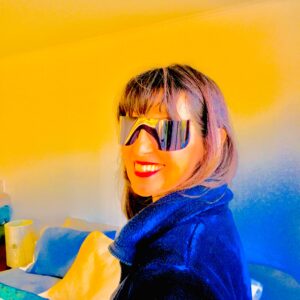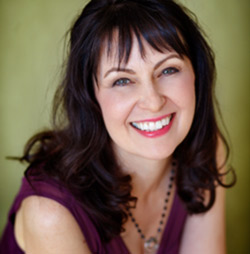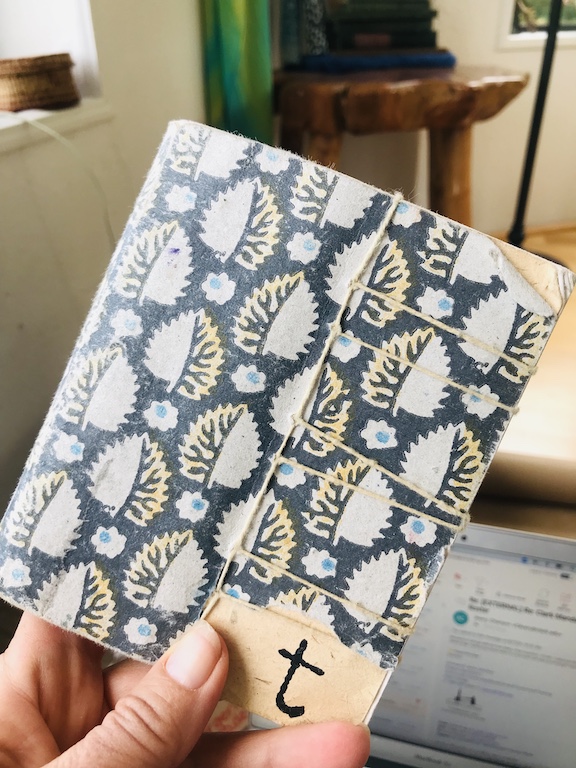
T is for Takeaways! This little book was stuffed into my only luggage (backpack) for three weeks.
After a traipse through Belgium and a twirl through the Netherlands, I am home from a European adventure. I’m so thrilled I did this, especially when my pre-trip jitters were through the roof. It never would have happened without my travel mentor, Julie.
(We coaches and mentors really are worth our salt. It is no shame to need support! What luck when the right teacher comes forward.)
So what are my trip takeaways?
Number one takeaway: track the takeaways!
If I don’t capture discoveries, insights, inklings, overwhelms, and understandings of my expedition, they disappear without a trace. I can’t catch them all, but I can jot them down in real time for reflection later.
It’s magic to process life as it happens. Ironically, in the everyday, you and I may have access to writing, but we are looking through “same-old, same-old” lenses, as if looking at a pile of rocks. Not much to write about. Conversely, when we leave home, we find tons of things to say, but it’s hard to write anything down.
My solution is to jot briefly in a travel notebook . . . adding color and images which brighten the page. Any moment or feeling, no matter how tiny or fleeting, warrants a line.
For this trip I used a handmade journal by Rosemary Hill of Florence, Oregon. I had a uniball water-resistant pen, and a tiny watercolor kit. When I leaf through the pages, I feel once again the rush, the wonder, the trepidation and the excitement of my voyages.
Which, by the way, don’t just happen.
Number two takeway: adventures require planning. Even for this spontaneous person.
I must allow the discomfort of racing thoughts as I absorb info from guidebooks, pamphlets, conversations, and visions about where (I think) I want to go. I note these in a full-size journal, and sometimes collect them in a physical file folder as well. Bits and pieces trickle into my smaller notebook. The brain loves physical sensory touchable objects and retains knowledge gathered this way much more effectively than through computer links. If you want to build a vision for travel (or anything) cut out photos with scissors, using your own hands.
In planning, I gather gear. This year I bought three travel dresses. (Two were $10 at the thrift store with the original tags on). I discarded each one after scrutinizing in the mirror. Those pockets were nice but stuck out on my hips. The straps were slouchy. The black was too busy to meld with my animal print scarf. I finally went with my tried-and-true little black travel dress that I’ve worn in France, Germany, Austria, and on the East and West Coasts. Isn’t it a thing that our favorites are our favorites because they fit a need so well?
What I realized as I journaled (in my bigger journal) about the pickiness of my packing was this: it was all part of my process. I had a ton of nervous energy, and making careful choices helped me express those emotions.
Number three takeway: writing helps emotionally. I can move through emotions with my own witnessing. Rereading those entries underscores courage and strength. Here are some emotion snips from my travel notebook.
Worry. Two days before leaving the country: “I feel worried I’m overlooking some important detail . . . leaving some task undone that will create disaster.” At the airport: “Issue with my boarding pass! Nervous and stressed. Waves of tired and wired, in the afternoon glare, with dizzy feet.”
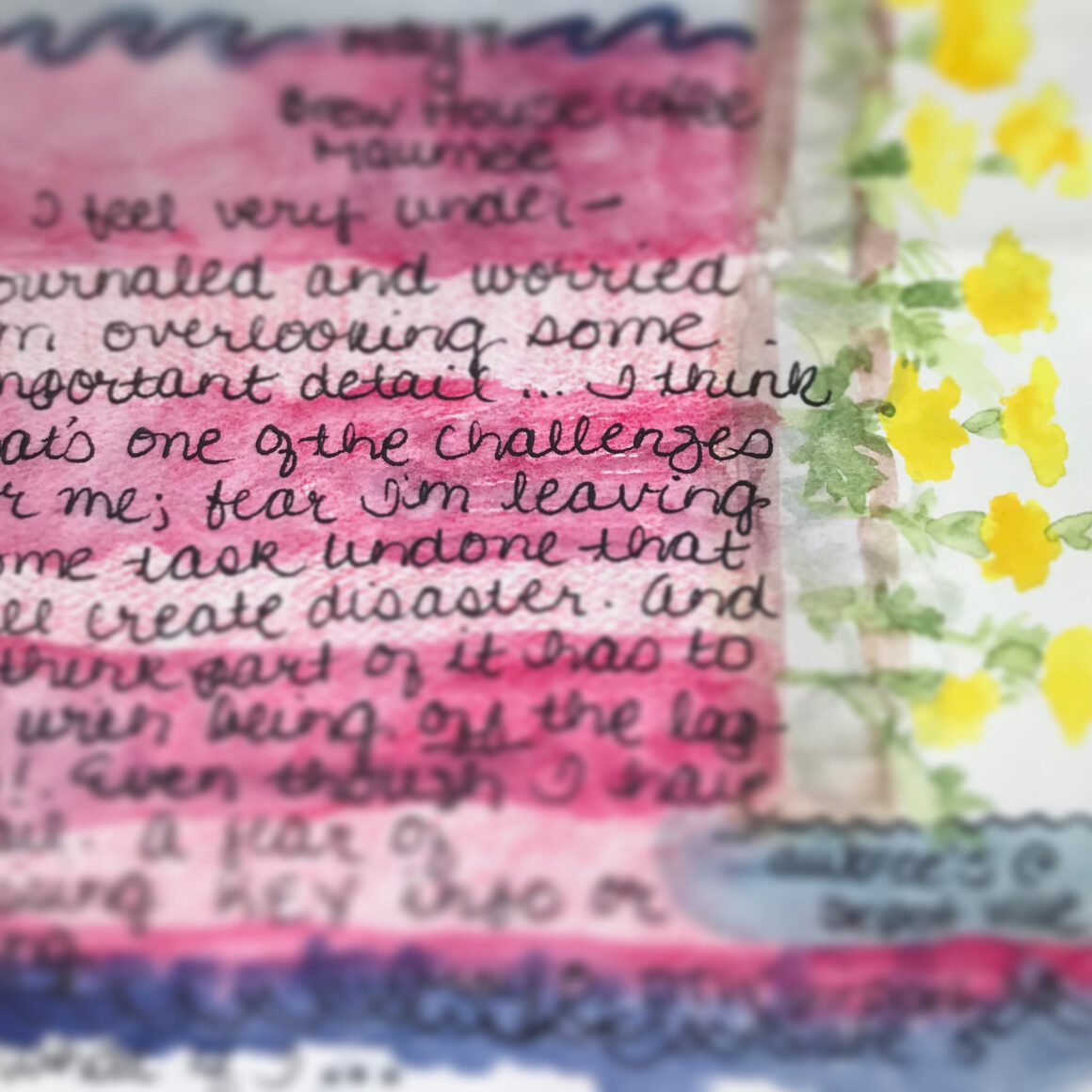 Gratitude. “Nancy N., thank you for the tips and support 26 years ago!” On the airplane, remembering the travel guide who led my very first trip to Europe.
Gratitude. “Nancy N., thank you for the tips and support 26 years ago!” On the airplane, remembering the travel guide who led my very first trip to Europe.
Spiritual Intention. “Pilgrimage, I’m up for you. However you are. This is grace. Melded with creativity . . . something new and unique and just right for me . . . just right for now.” On my flight to Frankfurt where my journey would start.
Shame. “It’s hard to ask for help because I am so afraid of looking stupid. I feel embarrassed without the power of language.”
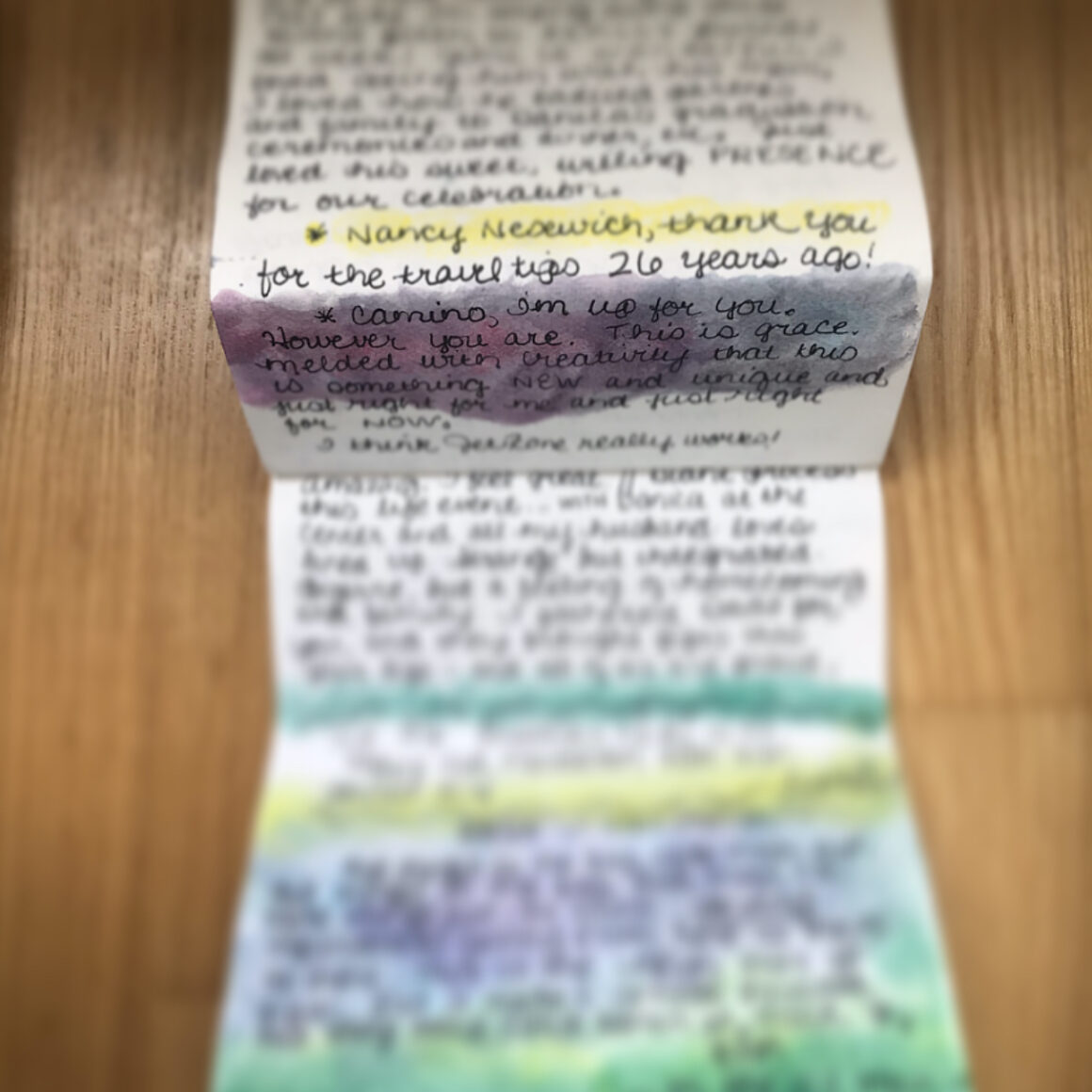 Triumph. “Hurray for the information officer in his storybook conductor suit and hat, and his thick French accent and thin mustache, who got me to the central train station!”
Triumph. “Hurray for the information officer in his storybook conductor suit and hat, and his thick French accent and thin mustache, who got me to the central train station!”
Awareness. “Finding my way is hard when I’m tired, stressed, and scared. I recall other lostnesses.”
Curiosity. “Geese honking as if about to fly, the way our geese at home squawk and gather before arching out of the pond and into the sky. But they aren’t leaving. Just now came another rapid-honk ruckus, insistent, with one higher voice like a rusty bicycle horn, joined by a throaty-voiced goose and now and then another or two. In this music-making all night, all morning, they flitted from green slow water to riverbank. One goose stood against the guardrail as I passed by on my evening stroll. They are homebodies, busybodies in this bucolic town. They have seen it all.”
Hobbit Feelings. “I love my home life and routine. Half my brain says, adventures are such a bother!”
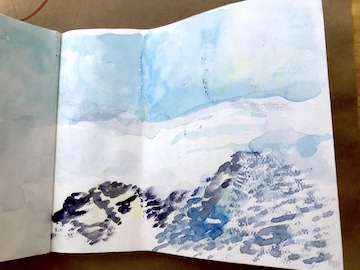 Forgetfulness. “I can’t remember how to spell.”
Forgetfulness. “I can’t remember how to spell.”
Paranoia. “These kids are maybe middle school. The girl is fake-sleeping across the boy, his arm under her head. She has pink gauzy leggings and white Nikes under her long, black abaya. ‘Madame?’ she said to me when I kept walking around to choose a seat on the train. Now she opens her eyes and all four of these kids are gurgling and bursting with laughter. Laughing is annoying in another language . . . it feels derisive.”
Welcome. “Getting tea this morning, reading labels on unrecognizable packets and boxes and jars. Not finding tea bags, seeking a strainer. Puzzle solving, map reading, deciphering. Kind of wonderful. I’m not savvy, not a good navigator. But my sturdy pilgrim heart finds a way. I am always embraced! And now I decide the kids on the train were indeed laughing at me, but wary, too, that they were in my seat. And the geese are bleating a happy welcome. All are saying: we are all your home.”



 Gratitude. “Nancy N., thank you for the tips and support 26 years ago!” On the airplane, remembering the travel guide who led my very first trip to Europe.
Gratitude. “Nancy N., thank you for the tips and support 26 years ago!” On the airplane, remembering the travel guide who led my very first trip to Europe. Triumph. “Hurray for the information officer in his storybook conductor suit and hat, and his thick French accent and thin mustache, who got me to the central train station!”
Triumph. “Hurray for the information officer in his storybook conductor suit and hat, and his thick French accent and thin mustache, who got me to the central train station!” Forgetfulness. “I can’t remember how to spell.”
Forgetfulness. “I can’t remember how to spell.” I love Dappled Things journal so much! They explore faith through such evocative lenses. (Incidentally, they take their name from a line in “Pied Beauty,” by Gerard Manley Hopkins.)
I love Dappled Things journal so much! They explore faith through such evocative lenses. (Incidentally, they take their name from a line in “Pied Beauty,” by Gerard Manley Hopkins.)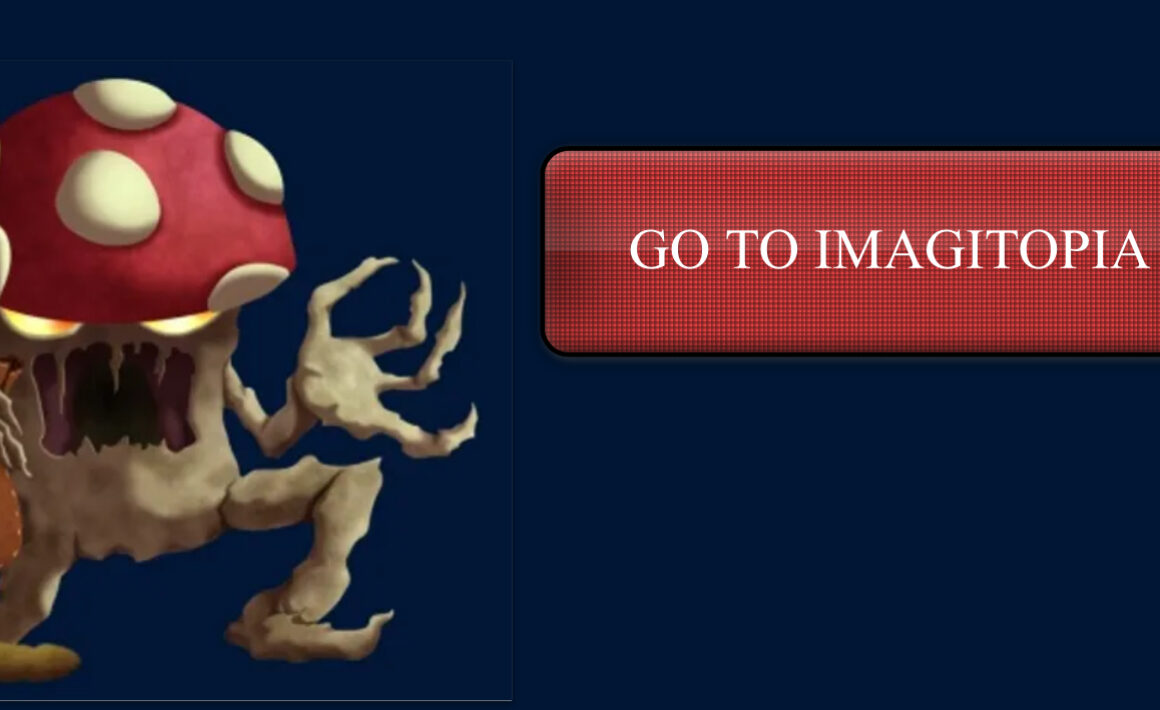


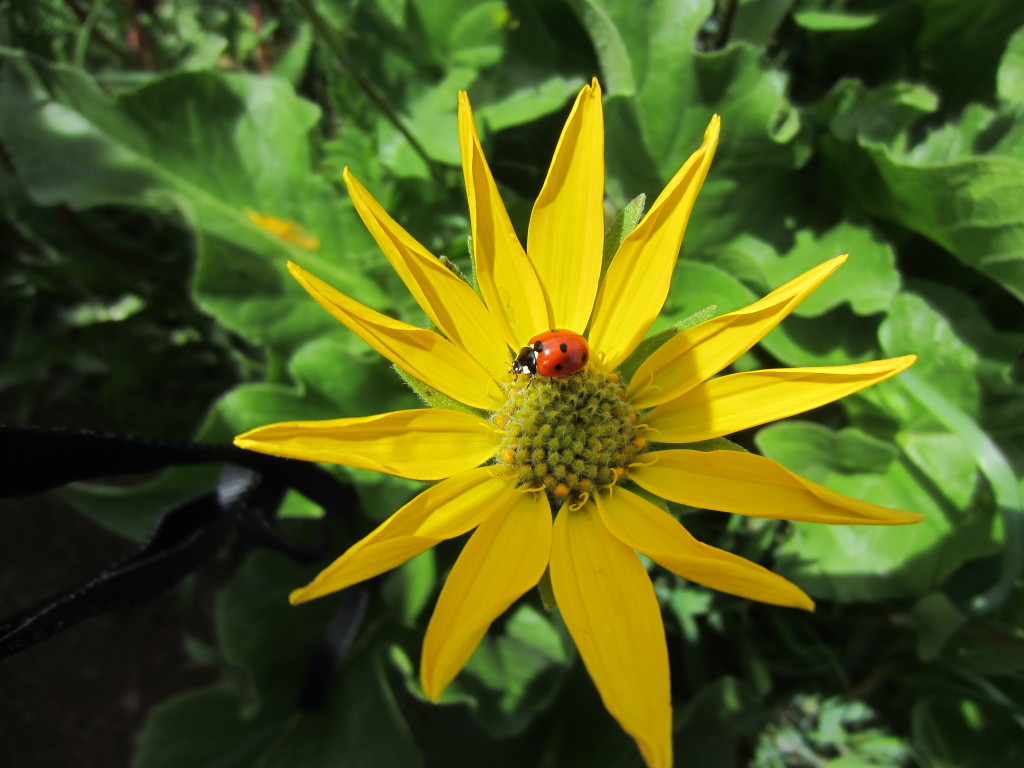
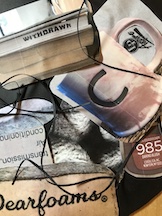
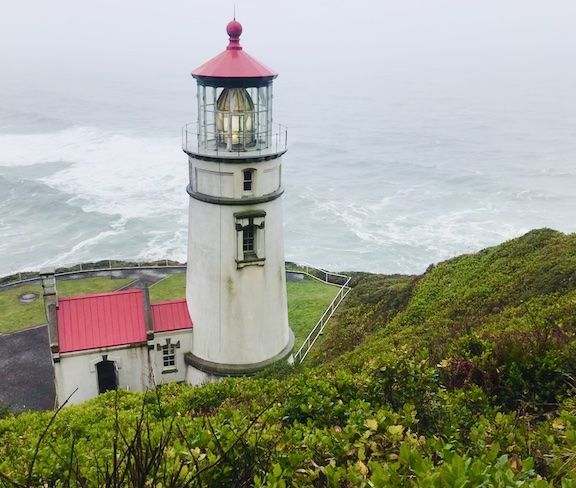
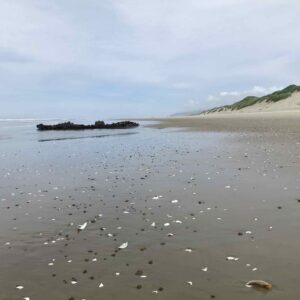 I can’t believe it’s been nine months since I moved to the Oregon Coast. Some adjustments have been huge, some small. One thing that’s changed: all my jacket pockets are lined with sand.
I can’t believe it’s been nine months since I moved to the Oregon Coast. Some adjustments have been huge, some small. One thing that’s changed: all my jacket pockets are lined with sand.